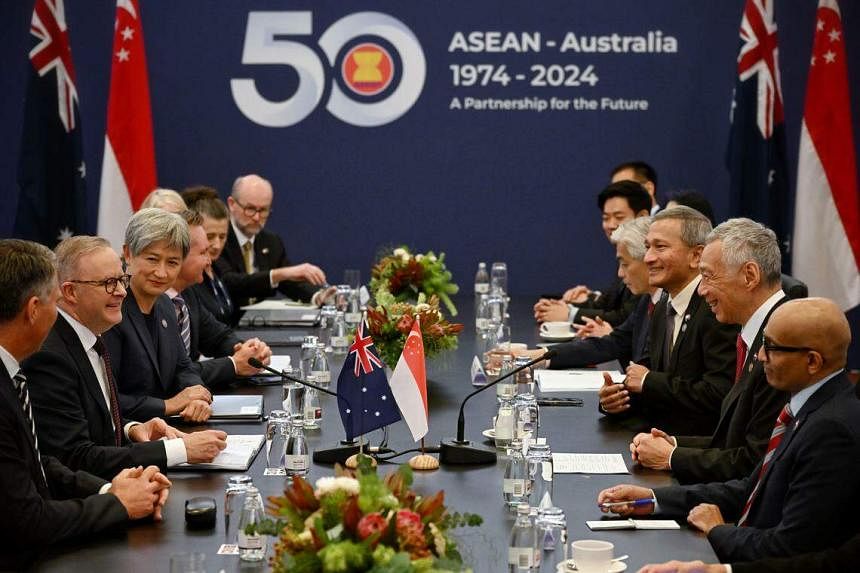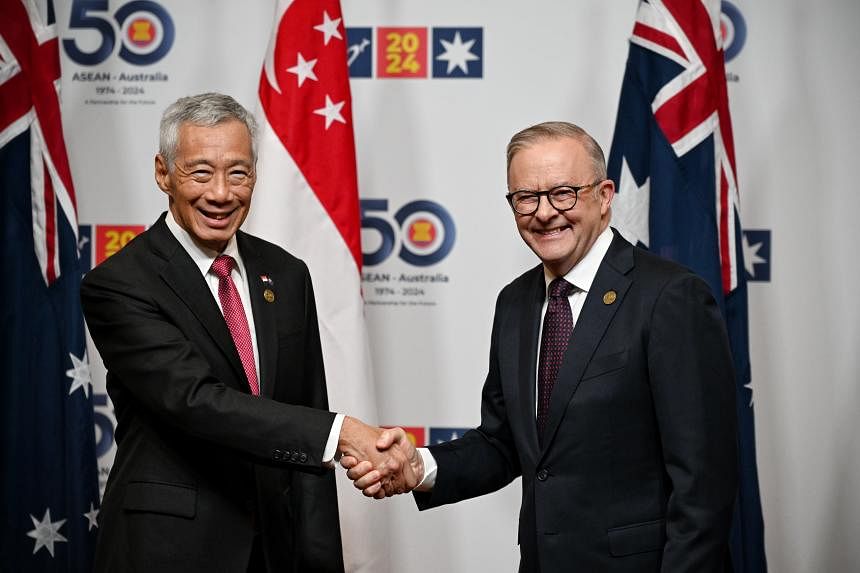MELBOURNE - Singapore and Australia will enter a new phase of partnership in 2025, with their leaders pledging to cooperate in fresh and strategic ways, amid geopolitical uncertainties.
These new areas of cooperation include the fields of renewable energy, supply chain resilience, artificial intelligence and air connectivity, said Prime Minister Lee Hsien Loong on March 5, adding that they fit well with the priorities of both countries.
“There is much more that our two countries can do together. After all, we are natural partners with complementary economies, (as well as) compatible world views and strategic perspectives on the region and on international affairs,” said PM Lee, speaking at a joint press conference with his Australian counterpart Anthony Albanese shortly after the Singapore-Australia Annual Leaders’ Meeting concluded in Melbourne.
Giving an update on the Singapore-Australia Green Economy Agreement signed in October 2022, PM Lee said that the effort – which facilitates trade in environmental goods and services and the promotion of investment in the green economy – has made significant progress.
On March 5, the leaders welcomed the signing of a Green and Digital Shipping Corridor memorandum of understanding, to encourage maritime decarbonisation and digitalisation, as well as a set of principles that both sides have jointly developed to guide cross-border electricity trade for the region.
PM Lee, who will be in Melbourne until March 6 to attend the Asean-Australia Special Summit, said that ministers and officials from both sides have been tasked to develop an “ambitious” plan for their next chapter of cooperation.
In 2025, the two countries will mark the 10th year since forging a Comprehensive Strategic Partnership (CSP), as well as the 60th year of establishing diplomatic relations.
“We share a vision for an open, stable and prosperous region. And this meeting has solidified a relationship that is unique in its depth and breadth, and a relationship that we are turning to the future,” said Mr Albanese, calling the new phase “CSP 2.0”.
Both leaders agreed that cooperation under the next stage of their partnership should be ambitious, future-oriented and pathfinding, and will comprise initiatives across a wide range of sectors, such as food security, energy security and cyber and critical technologies.
This year’s Asean-Australia Special Summit marks the 50th anniversary of Australia becoming the bloc’s first dialogue partner.
The meeting of regional leaders in Melbourne comes against a backdrop of increasing geopolitical tensions and economic rivalry between the United States and China, as well as during a period where conflict continues in Myanmar, Ukraine and Gaza.
While in Melbourne, PM Lee also met Cambodian Prime Minister Hun Manet. Both leaders affirmed the good relations between the countries and discussed collaboration in the areas of sustainability and the export of renewable energy from Cambodia to Singapore.
At a meeting between PM Lee and New Zealand leader Christopher Luzon, they spoke about advancing cooperation in various avenues, such as supply chain resilience.
At the Singapore-Australia meeting, both prime ministers expressed continued commitment to promote peace and stability in the region, and also the South China Sea, where negotiations over a code of conduct to avert confrontations between competing parties are progressing slowly.
Negotiating a code of conduct is a “common position” of Asean members, but to negotiate and to settle it will take some time, said PM Lee, responding to a question over managing the different reactions among Asean members towards China’s actions in one of the world’s most crucial waterways.
China claims sovereignty over virtually the entire South China Sea, although a United Nations tribunal found this to be without legal basis in 2016. While countries such as Malaysia and Vietnam also have competing claims, the Philippines, which has had increasingly intense run-ins with China in the past several months, has been the most vocal.
On March 4, Philippine Foreign Minister Enrique Manalo, who is attending the Asean-Australia Special Summit, urged regional neighbours to stand together more strongly in upholding the rule of law in the South China Sea.
Said PM Lee on March 5: “The issues are not easy to resolve, and really, negotiating a code of conduct inevitably raises issues of what the ultimate outcomes are going to be. And therefore, because the ultimate answers are difficult, so, too, negotiating the code will take quite some time.”
In recent years, Australia has moved to boost engagement with Asean. In 2023, it launched its South-east Asian economic strategy to increase trade and investment with its regional neighbours, particularly in key sectors like the growing clean energy sector.
PM Lee said that he and Mr Albanese had discussed regional and geopolitical developments during the bilateral meeting, where both agreed on the importance of an open and inclusive rules-based multilateral order that supports Asean Centrality.
Asean Centrality broadly refers to approaching the bloc as the dominant regional platform to tackle common challenges and drive engagement with external powers.
“Singapore has long supported Australia’s strengthening links with South-east Asia and will always continue to do so. Our bilateral relations continue to flourish amidst global uncertainty and economic headwinds,” said PM Lee.

Singapore and Australia have close and longstanding ties in the areas of defence, science and innovation, as well as economic trade. In 2023, Australia was Singapore’s 10th-largest trading partner, with total bilateral goods traded amounting to $29.6 billion.
The two nations share a long-term defence and security partnership, and both leaders underlined and affirmed the progress on related programmes, such as plans to expand the Shoalwater Bay Training Area in Queensland that is to be completed in 2024, and to further expand training opportunities for the Singapore Armed Forces in Australia.
The defence cooperation between the two nations is an important aspect of the partnership, and Singapore has “significant” air force detachments in Australia. In turn, Australian ships and aircraft are welcome to visit Singapore, said PM Lee.
“(And) when the Australian new submarines are ready, we welcome them to visit Changi Naval Base in due course,” he added.
In 2021, Australia, Britain and the US announced a trilateral security partnership for the Indo-Pacific amid concern of China’s growing power and influence in the region. Among other initiatives, the Aukus pact will allow the Royal Australian Navy to acquire conventionally armed nuclear-powered submarines. However, the pact has also raised concerns by Indonesia and Malaysia that it could worsen tensions in the region.
Singapore has previously said that it was “comfortable” with all the three partners within Aukus because it had long-term relationships with each of them.
Since Singapore and Australia became Comprehensive Strategic Partners in 2015, the two have teamed up on more than 100 initiatives in various sectors, such as digital and green economy.
Noting PM Lee’s intention to step down later in 2024, Mr Albanese said Australia and others in the region have benefited from the Singapore Prime Minister’s “acute understanding of our strategic circumstances” and his “commitment to building a region that is open and stable”. “He is an extraordinary leader for our region and I wish him very well for his future,” said Mr Albanese.


